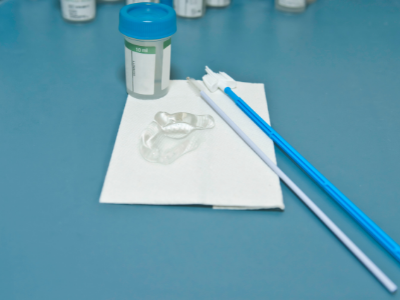Get Help Now
What is a Pap Smear?
A Pap smear (or Pap test) is a screening test for cervical cancer. A Pap Smear looks for cell changes on the cervix that could advance to cancer if not evaluated and treated appropriately. HPV (human papillomavirus) is often tested with the Pap test. This is a virus that can cause cell changes on your cervix. During your pap test, the clinician will use a plastic or metal instrument called a speculum. This speculum is gently placed into your vagina and a warm light above helps examine your vagina and cervix. The clinician will collect cells and mucus from your cervix and place into a container to send to the laboratory. The laboratory will check for abnormal cells and HPV if this test is right for you.
Will a Pap Smear hurt?
It is normal to feel some discomfort during a Pap Smear, but it shouldn’t hurt. A speculum will be placed into your vagina to allow your provider to see more clearly. A cotton swab will then be done on your cervix.
How often should I get a Pap Smear?
Only you and your healthcare provider can determine what is right for you. Pap screening tests are often based on women’s age, and medical history. Professional groups of doctors and specialists from all over the world, called Societies, join in a large conference meeting and give expert opinions and make decisions on cancer screening tests and treatment if needed. These decisions are important to you because they are based on evidence and testing from women like you. Healthy women age 21-29 usually need a pap test every three years. It is not recommended to have a pap test every year.Current screening recommendations based on guidelines from the American Cancer Society (ACS), the American Society for Colposcopy and Cervical Pathology (ASCCP), the American Society for Clinical Pathology (ASCP), the US Preventive Services Task Force (USPSTF), and the American College of Obstetricians and Gynecologists (ACOG), are:
- < 21 years: No screening recommended
- 21-29 years: Pap smear every 3 years
- 30-65 years: HPV test and pap smear every 5 years, or pap smear alone every 3 years
- >65 years: No screening recommended if adequate prior screening has been negative and high risk is not present
It is important to remember that anytime you feel pain or discomfort, or think something may not be normal with your health, to seek professional medical care to ensure the issue is not something serious. Contact us if you have:
- Abnormal vaginal bleeding
- Vaginal discomfort
- Badly smelling discharge
- Painful Urination
- Unexplained pelvic pain
- Visible sores, bumps, or blisters on your genital area
- Pain during or after sex
What do my Pap Smear results mean?
Your Pap test is reported as normal, inconclusive, or abnormal.
Normal: A normal Pap test means that abnormal cells have not been detected in the sample from your cervix. This means that it is not likely that cervical cancer is present. Since the Pap can miss disease, it is important to have your next Pap when it is due.
Inconclusive (also called ASC-US): An ASC-US result means that your cells don’t look normal, but they don’t look abnormal either. These results may be referred to as inconclusive. 75% of women with an ASC-US result have no abnormal cells on their cervix.
Abnormal: Abnormal results indicate that cell changes caused by HPV are present. The changes can be mild, moderate or severe. Most women with abnormal cells do not have cancer, but more severe abnormal cells may progress to cancer over time.
My Pap Smear results were abnormal, what now?
Treatment is based on your test results and your healthcare provider can give you more information about this. Treatment should begin at 21 years old. This prevents treatment in young women who are at low risk for cervical cancer. The most common treatment option is observation for one year and then repeats the screening test. Your provider may tell you that you need further diagnostic testing to look more closely at your cervix and examine and/or biopsy any abnormal cells. Some of these procedures may include:
- Coloposcopy
- LEEP Procedure
- Endometrial Biopsy
- Vulvar Biopsy
Remember, having abnormal cells does not mean you have cancer or are going to get cancer. Abnormal cells can usually be treated to prevent further complications. It is likely you will be recommended to have more regular Pap Smears in the future to monitor your specific situation. Ask your healthcare provider which treatment option is best for you

Telehealth Services Available!
Many services available from the comfort of your home. Tap/Click for more!
